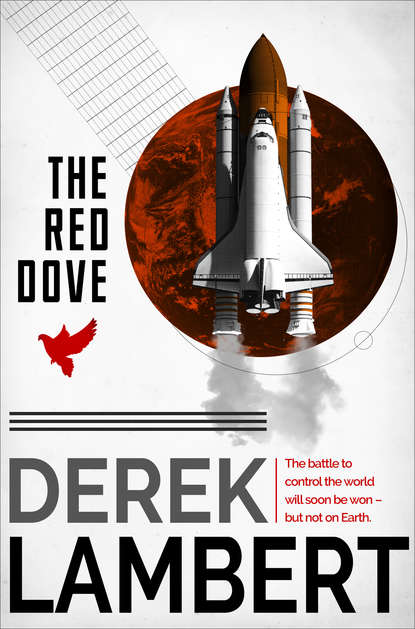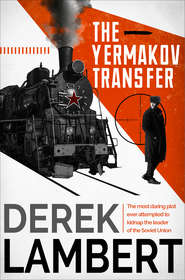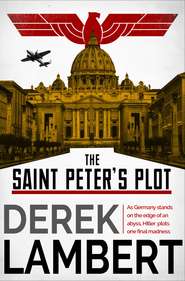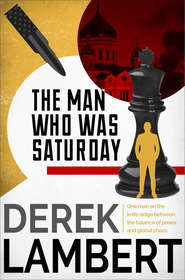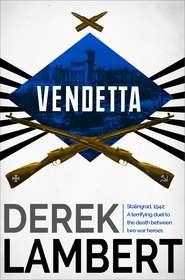По всем вопросам обращайтесь на: info@litportal.ru
(©) 2003-2024.
✖
The Red Dove
Автор
Год написания книги
2018
Настройки чтения
Размер шрифта
Высота строк
Поля
The first shuttle had landed on Rogers Dry Lake at the Dryden Space Center in California’s Mojave Desert. Now Kennedy was geared to take most of the traffic.
As far as Reynolds was concerned the space centre that mattered was Vandenberg, not far from the Presidential ranch. From its $200 million launch complex shuttles flew over the North and South Poles keeping most of the populated world under surveillance. Even more important was the Military Mission HQ inside Cheyenne Mountain in Wyoming where they concentrated on spy satellites, beam weapons, war in space …
Shots of the approach to Florida taken by cameras inside the shuttle appeared on the TV screen. But the crowds waiting for landing were nothing compared with the great concourse that had assembled for the first touchdown. Commuting with space had been accepted more smoothly than the first railroad engine.
It was a remark by the First Lady while they were watching the TV that first exploded possibilities in Reynolds’ brain.
The President was talking about a future in which space stations, laboratories, hotels, whole complexes would orbit the globe, their occupants flying back and forth from the earth like New Yorkers commuting between Long Island and Manhattan.
On the screen Columbia with its stocky, delta-winged body and foraging beak, was making its last turn before its final approach. Beneath it Florida and the cobalt-blue Atlantic looked like a relief map.
‘But who owns space?’ she asked. ‘How can it be divided?’ In the same tone, Reynolds reflected, that a president’s wife might once have dismissed pioneers’ claims to the West.
He finished his cocktail and told her: ‘I don’t know the answers to your questions but I do know that, if it is divided, it will be divided through strength. Through strength, not necessarily aggression,’ holding up one defensive hand.
‘At least we got the shuttle up there first,’ the President said. ‘We’ll bargain from power.’
‘That depends,’ Reynolds said, ‘on what the Soviets have got up their sleeves. We know they shelved their own basic shuttle because we got up there first. We know they’ve now launched their own modified ship and we know they plan to assemble a space station in space. What we don’t know is the capability of their new ship and how many of them they’ve got.’
On the screen the Columbia was gliding towards the runway, smoother than a conventional jet.
‘What sort of capability are you talking about?’ the President asked.
‘The capability to command space,’ Reynolds said crisply. ‘To win the next war – if the Russians want one.’
‘Beams?’
‘To put it more definitively CPBs, charged particle beams. Rays capable of travelling at the speed of light,’ he explained to the President’s wife, ‘and penetrating a target instead of just melting its surface like an ordinary laser. You may recall that in ’77 General George Keegan, head of Air Force Intelligence, quit his job because your husband’s predecessor didn’t take his warnings seriously. Well, a lot of people at the Pentagon figure that the Russians have been working on a scheme to equip their shuttles with CPBs. That way they could command the heavens.’
‘Pearl Harbor in space,’ the President said. ‘Except that I have heeded the warnings.’
‘Star Wars,’ murmured his wife. ‘Unbelievable, terrifying.’ And, as Columbia straightened out over the runway, she pointed at the screen and said: ‘If there was such a war that could be a crippled Soviet shuttle landing in the United States,’ which was the remark that, like a depth charge, projected inspiration from the depths of Reynolds’ subconscious.
As he watched Columbia touch down he imagined red stars on its wings. From the cockpit he heard Russian voices. At the head of the stairway he saw a cosmonaut emerge, wave wearily and depart for the medical centre leaving behind at the end of the runway the greatest military prize ever deposited in the lap of the United States.
But why do I only see one cosmonaut? he wondered.
‘George, it’s all over.’ It was the President’s voice but Reynolds heard it from a long way off. ‘George, I’m speaking to you. Dinner’s ready for God’s sake.’
Reynolds followed them into the dining room, sat down and began to eat his prawn cocktail.
The First Lady poured chilled Californian white wine and said: ‘George, are you all right? You look as though you’ve seen a vision.’
Which he had. It seemed extraordinary to him that neither the President nor his wife had seen it. But why only one cosmonaut? There should have been at least two on board, more with mission specialists.
He sipped the wine, held it up to the light of the sunset flaming on the horizon. As he did so he re-focused his attention on his hosts. ‘Forgive me,’ he said to the President’s wife. ‘I was thinking about something your husband said this afternoon.’
Later, over T-bone steaks and green salad, he resurrected the shuttle landing but only circumspectly because, at this stage, he didn’t want to share his vision with anyone, least of all the President, in case it had no substance.
‘You would have thought,’ he said casually, ‘that both the astronauts would have emerged at the same time.’
They stopped eating and looked at him in surprise. The President said: ‘But we didn’t see any of them come out,’ and his wife asked: ‘Are you sure you’re feeling all right?’
‘I’m sorry,’ Reynolds said, ‘I was thinking ahead,’ and before they could work that one out he added: ‘I guess I’ll turn in early tonight. Chopping down trees is okay for a 72-year-old Peter Pan but not for a middle-aged mortal.’
After dessert he excused himself and went to his room. For a time he lay on the bed fully dressed, hands behind his head, thinking. Why only one cosmonaut?
He closed his eyes. He was back in Moscow in the early seventies when he was counsellor and CIA co-ordinator in the US Embassy. And he was at a rendezvous in Sokolniki Park with a double agent from GRU.
It was sweaty hot, he remembered, and in front of the bench where he was waiting a group of children on bicycles and tricycles were learning road drill on a mock-up street complete with traffic lights.
The man who joined him was well cast for the meeting. The park had once been a hunting ground for the Tzars – Sokolniki was a derivation of sokol meaning falcon – and Vadim Muratov looked like a bird of prey. Lean, greying and greedy.
The exchange was a cliché but still the way they did it in the eighties. One crumpled copy of Pravda containing Muratov’s payment, 300 roubles-worth of coupons which he could spend in the beryozka shops; one crumpled copy of Trud containing the information Muratov was selling.
Each picked up the other’s newspaper and, after watching the children for a few moments, went their respective ways. The mock-up traffic lights, Reynolds recalled, had jammed at red as he left.
In his office in the embassy Reynolds studied Muratov’s 300 roubles-worth of information. It wasn’t calculated to set either the River Moskva or the Potomac on fire. Not then.
According to Muratov a young cosmonaut named Nicolay Talin, quite brilliant apparently, a future captain of space, had been investigated by GRU because of his outspoken views. He was a bit of a rebel, not a totally unacceptable attitude – the Soviet Union had been founded on rebellion – but his views were idealistic and if idealism didn’t conform with the Communist dream then it was criminal.
But Talin was getting away with it for two reasons. (1) He was an exceptionally gifted candidate for aerospace travel; (2) He was being protected by a senior KGB officer named Oleg Sedov.
And that was all. Reynolds instructed a junior CIA officer to check out Talin and then, because it wasn’t that urgent, sent the details to Washington by courier and forgot them. Until today.
Suddenly Reynolds knew why, in his vision, only one cosmonaut had emerged from the Russian shuttle; the others were either dead or wounded. Nicolay Talin had been persuaded to defect and had overcome the rest of the crew. The President just might have his spectacular. Reynolds reached for the bedside telephone and called CIA headquarters.
Reynolds slept fitfully that night, dreams and waking thoughts merging into a confused interrogation. The subject of the interrogation was himself, the topic truth – an elusive quality when you were the director of an organisation specialising in deception.
And, under this jumbled third-degree, he admitted that, although he was the ultimate patriot, his sentiments regarding the President’s spectacular were not entirely chauvinistic. There was an element of personal interest in them, a touch of self-preservation.
Recently, yet another Congressional inquiry into the activities of the CIA had been mounted. In Reynolds’ opinion the KGB couldn’t do a better hatchet job on the Company than some of the United States’ own politicians. What he couldn’t abide was their naïvety, assuming, that was, that there were no darker motives. Why, in God’s name, undermine your own clandestine defences while your enemies systematically expanded theirs?
In a waking moment Reynolds recalled the words of a certain crusading politician:
‘If we accept this idea of secrecy for secrecy’s sake, we will have no way of knowing whether we have a fine intelligence service or a very poor one. Secrecy now beclouds everything about the CIA – its cost, its efficiency, its successes and its failures.’
That had been said way back in 1956 by Senator Mike Mansfield from Montana. Nothing had changed. Secrecy for secrecy’s sake … How the hell could a secret service be overt?
Since taking office, immediately after the President had been elected, Reynolds had survived every investigation, arguing coldly and contemptuously that CIA duplicity was a necessary evil designed to combat the far more sinister intrigues of the Soviet Union and its lackeys. In the anti-Soviet mood prevalent in the US Reynolds had coasted home.
But the latest inquiry was the most dangerous yet.
An audio-visual surveillance operation had been mounted on a group of foreign businessmen visiting the fleshpots of Los Angeles, San Francisco and Las Vegas. Sex, drugs, gambling, alcoholic intake – every peccadillo had been photographed and recorded. All well and good except that (1) the operation had been blown and (2) the foreigners were Arabs.
With the result that the Arab government in question was now threatening to cut off oil supplies to the United States because of a ‘gross impertinence’ authorised personally by none other than George Reynolds, Director of the CIA.
Not that they would because the tide of oil was beginning to turn against Arab domination of the market. Nevertheless, America had been put in an embarrassing position, which was a windfall for the lemming-like critics of the CIA. Reynolds had no doubts about the wisdom of authorising the surveillance – the Washington-based Arabs had been engaged in espionage – and his only regret concerned the foul-up his agents had made of it.





